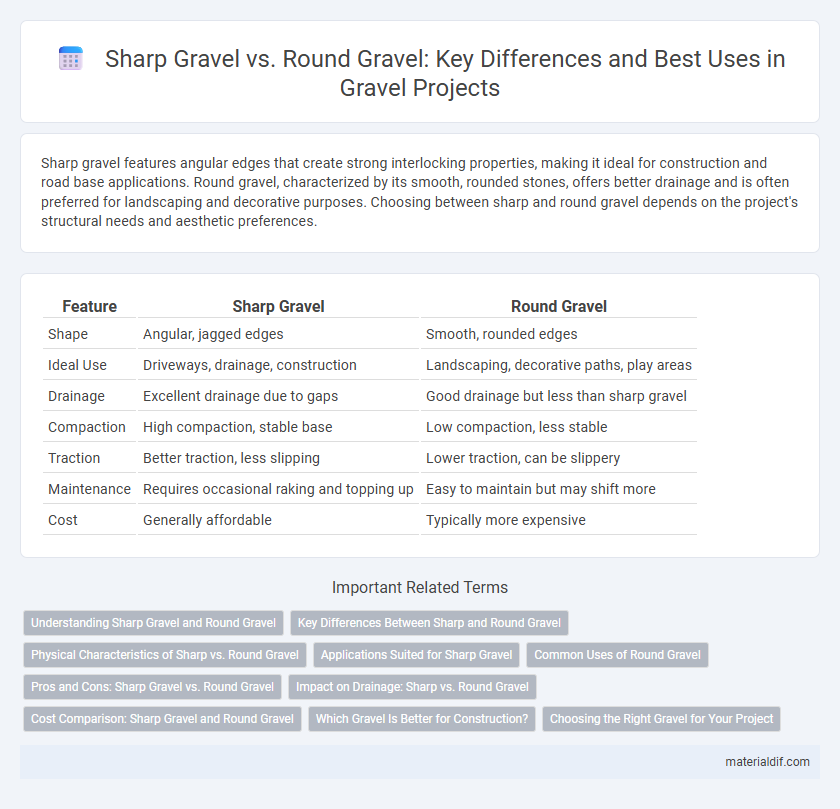Sharp gravel features angular edges that create strong interlocking properties, making it ideal for construction and road base applications. Round gravel, characterized by its smooth, rounded stones, offers better drainage and is often preferred for landscaping and decorative purposes. Choosing between sharp and round gravel depends on the project's structural needs and aesthetic preferences.
Table of Comparison
| Feature | Sharp Gravel | Round Gravel |
|---|---|---|
| Shape | Angular, jagged edges | Smooth, rounded edges |
| Ideal Use | Driveways, drainage, construction | Landscaping, decorative paths, play areas |
| Drainage | Excellent drainage due to gaps | Good drainage but less than sharp gravel |
| Compaction | High compaction, stable base | Low compaction, less stable |
| Traction | Better traction, less slipping | Lower traction, can be slippery |
| Maintenance | Requires occasional raking and topping up | Easy to maintain but may shift more |
| Cost | Generally affordable | Typically more expensive |
Understanding Sharp Gravel and Round Gravel
Sharp gravel consists of angular, jagged stones that lock together tightly, providing superior traction and stability for construction and landscaping projects. Round gravel features smooth, naturally weathered stones that allow for easier drainage and less compaction, making it ideal for decorative pathways and garden beds. Understanding these differences in texture and performance helps in selecting the right gravel type based on specific project requirements.
Key Differences Between Sharp and Round Gravel
Sharp gravel features angular, jagged edges that enhance interlocking and stability, making it ideal for construction and road base applications. Round gravel consists of smooth, worn, and polished stones, offering better drainage and a more decorative appearance suitable for landscaping and pathways. The key differences lie in their shape, texture, and functional use, with sharp gravel providing superior compaction and round gravel promoting aesthetic appeal and water flow.
Physical Characteristics of Sharp vs. Round Gravel
Sharp gravel consists of angular, jagged edges that provide superior interlocking and stability, making it ideal for construction and drainage applications. Round gravel features smooth, rounded surfaces with little interlock, which allows for better water flow but less structural support. The physical characteristics of sharp gravel enhance compaction and load-bearing capacity, whereas round gravel excels in aesthetic appeal and erosion resistance.
Applications Suited for Sharp Gravel
Sharp gravel features angular, rough edges that provide excellent interlocking properties, making it ideal for construction applications like driveways, road bases, and concrete mixes where stability and compaction are critical. Its ability to lock together tightly improves load distribution and prevents shifting under heavy traffic or pressure. This gravel type also excels in drainage systems by maintaining structural integrity while allowing water to flow through efficiently.
Common Uses of Round Gravel
Round gravel is commonly used in landscaping, drainage systems, and pathways due to its smooth texture that allows for easy water flow and comfortable walking surfaces. It is favored for decorative purposes in gardens and around plants, providing an aesthetically pleasing and natural look. Its rounded edges make it less likely to compact, enhancing soil aeration and preventing erosion in various outdoor projects.
Pros and Cons: Sharp Gravel vs. Round Gravel
Sharp gravel offers superior interlocking capability, providing excellent stability and drainage for driveways and pathways, but it can be rough underfoot and harder to compact evenly. Round gravel is smooth and comfortable to walk on with good aesthetics, yet it tends to shift and move more easily, requiring frequent maintenance to maintain surface integrity. Selecting between sharp and round gravel depends on the project's focus on durability versus comfort and appearance.
Impact on Drainage: Sharp vs. Round Gravel
Sharp gravel's angular edges create larger voids between particles, enhancing water flow and improving drainage efficiency compared to round gravel. Round gravel, with its smooth, rounded surfaces, tends to compact more tightly, reducing permeability and slowing drainage rates. For applications requiring optimal water runoff and soil aeration, sharp gravel is the preferred choice due to its superior drainage properties.
Cost Comparison: Sharp Gravel and Round Gravel
Sharp gravel typically costs less per ton than round gravel due to its abundance and easier production process, making it a budget-friendly choice for construction and landscaping projects. Round gravel, known for its smooth texture and aesthetic appeal, generally carries a higher price due to additional processing and sourcing requirements. Project costs can vary significantly based on gravel type, quantity, and delivery location, with sharp gravel favored for cost efficiency and round gravel chosen for decorative applications.
Which Gravel Is Better for Construction?
Sharp gravel, with its angular and jagged edges, provides excellent interlocking properties that enhance the stability and load-bearing capacity of construction foundations and concrete mixes. In contrast, round gravel features smooth, rounded particles that reduce friction, making it less effective for structural support but ideal for drainage and aesthetic landscaping. For construction purposes requiring strong compaction and durability, sharp gravel outperforms round gravel in providing a solid, stable base.
Choosing the Right Gravel for Your Project
Sharp gravel offers better interlocking properties and stability, making it ideal for driveways, pathways, and drainage projects that require firm compaction. Round gravel, known for its smooth texture, is preferable for decorative landscaping, garden beds, and areas where drainage and aesthetics are priorities without the need for heavy compaction. Evaluating the specific needs of your project, such as load support and visual appeal, is crucial in selecting the right gravel type.
Sharp Gravel vs Round Gravel Infographic

 materialdif.com
materialdif.com